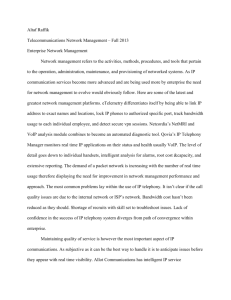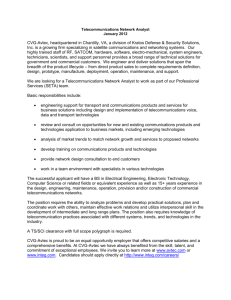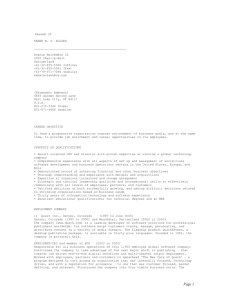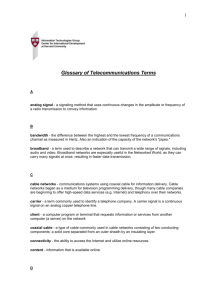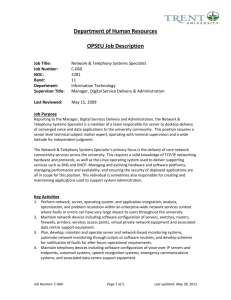TEXT FOR REMARKS OF COMMISSIONER SUSAN NESS WORLD TELECOMMUNICATIONS POLICY FORUM
advertisement
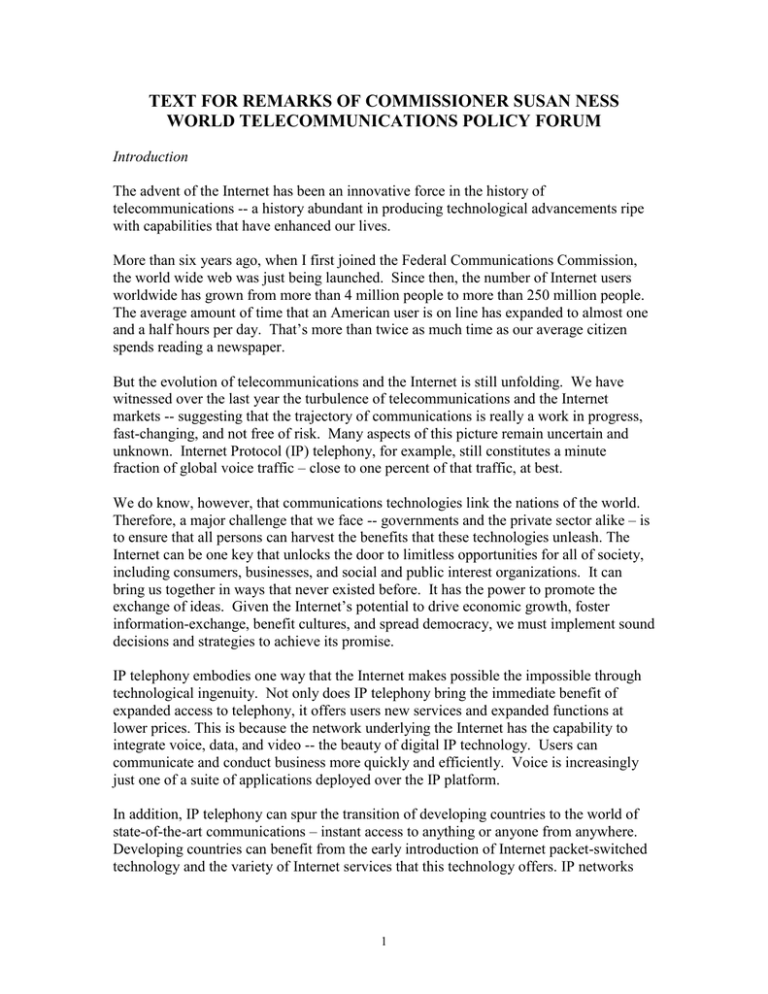
TEXT FOR REMARKS OF COMMISSIONER SUSAN NESS WORLD TELECOMMUNICATIONS POLICY FORUM Introduction The advent of the Internet has been an innovative force in the history of telecommunications -- a history abundant in producing technological advancements ripe with capabilities that have enhanced our lives. More than six years ago, when I first joined the Federal Communications Commission, the world wide web was just being launched. Since then, the number of Internet users worldwide has grown from more than 4 million people to more than 250 million people. The average amount of time that an American user is on line has expanded to almost one and a half hours per day. That’s more than twice as much time as our average citizen spends reading a newspaper. But the evolution of telecommunications and the Internet is still unfolding. We have witnessed over the last year the turbulence of telecommunications and the Internet markets -- suggesting that the trajectory of communications is really a work in progress, fast-changing, and not free of risk. Many aspects of this picture remain uncertain and unknown. Internet Protocol (IP) telephony, for example, still constitutes a minute fraction of global voice traffic – close to one percent of that traffic, at best. We do know, however, that communications technologies link the nations of the world. Therefore, a major challenge that we face -- governments and the private sector alike – is to ensure that all persons can harvest the benefits that these technologies unleash. The Internet can be one key that unlocks the door to limitless opportunities for all of society, including consumers, businesses, and social and public interest organizations. It can bring us together in ways that never existed before. It has the power to promote the exchange of ideas. Given the Internet’s potential to drive economic growth, foster information-exchange, benefit cultures, and spread democracy, we must implement sound decisions and strategies to achieve its promise. IP telephony embodies one way that the Internet makes possible the impossible through technological ingenuity. Not only does IP telephony bring the immediate benefit of expanded access to telephony, it offers users new services and expanded functions at lower prices. This is because the network underlying the Internet has the capability to integrate voice, data, and video -- the beauty of digital IP technology. Users can communicate and conduct business more quickly and efficiently. Voice is increasingly just one of a suite of applications deployed over the IP platform. In addition, IP telephony can spur the transition of developing countries to the world of state-of-the-art communications – instant access to anything or anyone from anywhere. Developing countries can benefit from the early introduction of Internet packet-switched technology and the variety of Internet services that this technology offers. IP networks 1 promote infrastructure build-out, human resource development, and innovation -- all of which are important to bridging the Digital Divide. For these reasons, the FCC encourages governments to remain open to the growth of IP telephony. But all of the benefits of IP telephony have not yet pushed themselves up through the soil, and IP telephony cannot be expected to change the landscape overnight. We must resist the temptation to label this new fruit of our technological harvest one thing or another based on existing regulatory frameworks. That is to say that we must be careful to avoid simply labeling IP telephony as “telecommunications” or “the Internet.” To be successful, IP telephony providers must have the technology to handle both telecommunications and the Internet. I recognize that Member States are grappling with how to treat IP telephony, as IP telephony raises a host of policy issues. My comments today will focus on the U.S. experience the growth of this technology to date. The U.S. Experience I want to share with you what we are doing in the United States, our work in progress. Although not all countries are in the same position, it is instructive to discuss where we have been, where we are going, and lessons we have learned along the way. We have had a long tradition of making decisions to adapt to the fast changes in communications technologies. It is in this overall historical context that I want to speak about IP telephony. We have tried to create an environment for competition, innovation, and investment to flourish in the hopes of benefiting consumers. By doing so, we cultivated the fertile ground in which the Internet has grown. The secret to the Internet’s success has been to let the competitive market thrive. Where competition has been present, innovation and investment have followed. Consumers of network services have spent the time and capital necessary to develop new services and applications, all of which have moved the control of these services from the network provider closer and closer to the consumer. The history of communications in the United States shows that regulations traditionally have been maintained only where a firm exercises market power over essential services and facilities or because of overwhelming public interest imperatives. For over one hundred years, this was the situation with providers of basic telecommunications services, and their regulation. Neither of these factors appears evident in the Internet realm today. But the FCC will continue to monitor carefully the situation as market forces continue to work. Let us look at the earliest days of this growth, and our regulatory response. In the 1960s, computer data processing technology was layered on top of telecommunications infrastructure to form a brilliant network design that would later give birth to the Internet. We asked ourselves then whether computer data process services should be treated like common carriers. The Commission acknowledged the innovative force of technologies that deliver enhanced services to the public and in its Computer Inquiry proceedings, 2 decided not to treat data processing services as a common carrier transmission. The Commission determined that enhanced services would best flourish if they could be provided on an unregulated basis. Since then, the FCC has continued along this path. In 1975, the FCC adopted a rule permitting customers to connect equipment to the phone network provided it would not harm the network. This decision contributed to the rapid deployment of the modem that Americans later would use to access the Internet. In the early 1980s, we determined that enhanced services would be exempt from access charges. The FCC stated that, by retaining the Enhanced Service Provider (ESP) exemption, we would avoid disturbing the stillevolving information services industry. This decision stimulated Internet expansion, made it affordable for consumers to access the Internet, and contributed to the vibrancy and competition that exist in today’s Internet and interactive computer services markets. In the 1980s, the courts decreed competition in the long distance telecommunications market. We moved aggressively to break-up monopolies and promote competition. These actions resulted in private capital flowing into the long-haul market and opened the market to resellers. Since 1984, rates have dropped 56 percent as a result of the competition from approximately 600 long-distance companies that are estimated to provide service today. And, most importantly, as a consequence of this decision, information infrastructure was built out – that is the foundation upon which the Internet rests today. In 1996, the policy decision to refrain from treating enhanced services, identified as information services, as telecommunications services was embodied in the Telecommunications Act by the U.S. Congress. In April of 1998, the FCC re-examined its Internet policies in the Universal Service Report sent to Congress (known as the Stevens Report). This report dealt largely with the impact of the Internet on the Universal Service Fund (USF). Generally, we reaffirmed that, as information service providers, Internet Service Providers (ISPs) are not required to make direct contributions to the USF as telecommunications carriers would. We noted, however, that such a policy does not erode USF because ISPs lease lines from telecommunications carriers that include the revenue from such lines in their USF contribution base. Accordingly, as ISPs grow, so does USF. After re-examining its policy on the Internet in the Stevens Report, the FCC affirmed that Internet services should not be subject to regulations designed for telephone networks – 3 our testimonial that competition and deregulation are the bedrock for a robust Internet economy. We preserved the unregulated status of IP telephony, although we noted that we would determine on a case-by-case basis whether certain phone-to-phone IP telephony – as opposed to computer-to-computer IP telephony configurations -- may be properly classified as telecommunications services. Our decision to adopt a case-by-case approach, rather than make definitive pronouncements in the absence of a complete record on specific offerings, was prudent due to the nascent state of the technology. As in other instances, the FCC recognized the dynamism of the Internet and the need to consider whether any tentative definition of IP telephony would be quickly overcome by technological changes. We further noted that – internationally -- IP telephony serves the public interest because it introduces alternative calling options in markets that would otherwise face little competition. The FCC more recently has concluded that as Internet-based services begin to compete with traditional telecommunications services, policy makers can further deregulate these legacy services. In other words, once the growth of competitive services levels the field in the marketplace, we can level the regulatory playing field through more deregulation. Conclusion The United States believes that, to the greatest extent possible, market forces should continue to drive technological advances and innovation in IP telephony. We cannot and should not get in the way of the technological revolution that is moving control of information and communications services from the builders of the networks to the consumers who use those networks. We must avoid slapping legacy regulations on the evolving market in an overabundance of caution, or risk inhibiting the development of the benefits of that evolution. IP telephony symbolizes one of the many marvels of advancements in communications technology. We must be open to its development so we can enjoy its benefits. Past experience also has taught us that policy makers need to be sensitive to the fact that technology is changing rapidly. We know that decisions once made by governments can often be made better and faster by the marketplace. Markets driven by technology can move faster than laws and regulations. This is our story. It is the blue print that we believe has helped the Internet prosper in the United States. It reflects the vision shared by many Americans – growing out of the consumers of services provided over networks. These users, including businesses, are taking advantage of IP telephony’s expanded applications. Consumers are making calls at affordable rates to reach family and friends. The number of U.S. online users has surged from 6% to 42% since 1993. And about one third of the U.S. real economic growth is tied to the Internet either directly or indirectly through our information and 4 telecommunications sectors. The Internet has been fruitful for our society in ways we and the builders of the legacy networks never imagined. And it will continue to produce new fruit, as long as we regulators tread as lightly as possible through the fertile field of Internet applications. Technological advances most often will make regulation unnecessary; unnecessary intervention that slows the growth of such progress may cause the desirable fruits of progress to wither on the vine. 5
